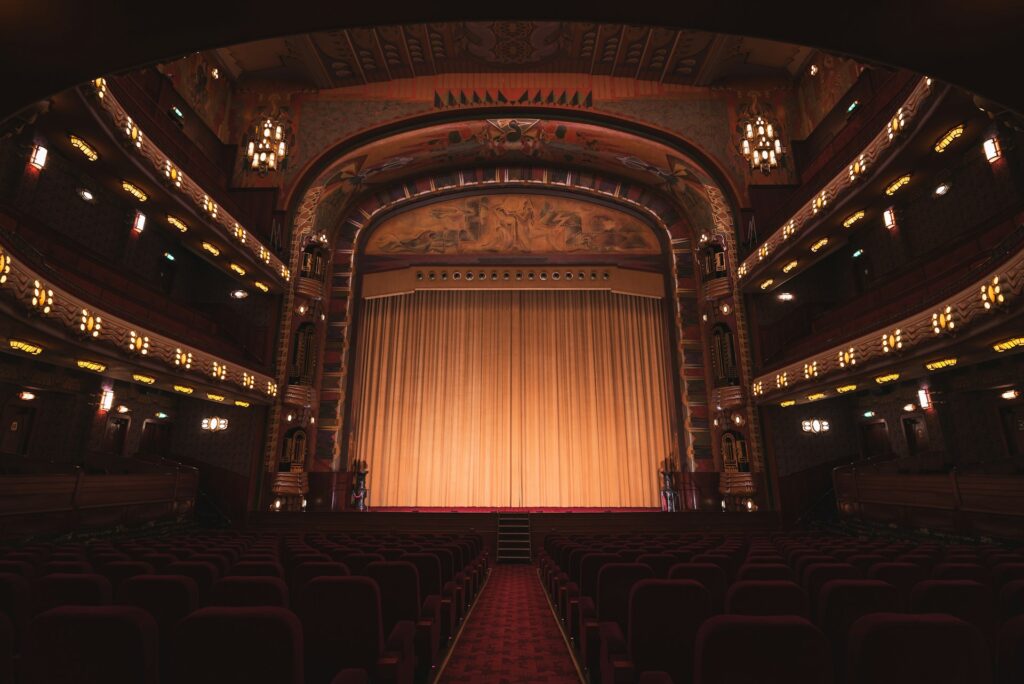Theater, often referred to as the “art of the stage,” is a dynamic form of artistic expression that has captivated audiences for centuries. It encompasses a wide range of live performances, including plays, musicals, operas, ballets, and more. At its core, theaters is a collaborative art form that combines various elements such as acting, directing, set design, and music to convey stories and evoke emotions.
What is theater?
At its simplest, theaters is a live performance presented to an audience. It can take place in a variety of settings, from grand theaters with elaborate stages to intimate black box theaters. Regardless of the venue, the essence of theater lies in the live interaction between performers and spectators.
Brief history of theater
The origins of theaters can be traced back to ancient civilizations such as Greece, Rome, and Egypt, where performances were often tied to religious rituals and festivals. Over time, theaters evolved into a sophisticated art form, with notable contributions from playwrights like William Shakespeare, Anton Chekhov, and Tennessee Williams.
Types of Theater
Theater is a diverse art form that encompasses various styles and genres. Here are some of the most common types of theaters:
Traditional theater
Traditional theater refers to performances that adhere to classical conventions and styles. This includes classic plays, operas, and ballets that are often performed in formal venues such as opera houses and theaters. Traditional theaters places a strong emphasis on scripted dialogue, elaborate costumes, and grandiose sets.
Contemporary theater
Contemporary theater, on the other hand, encompasses a broader range of experimental and avant-garde performances. This includes devised theaters, immersive experiences, and site-specific productions that push the boundaries of traditional storytelling. Contemporary theater often explores current social issues and challenges artistic norms.
The Elements of Theater
Theater is a multidisciplinary art form that combines various elements to create immersive experiences for audiences. Some of the key elements of theaters include:
Acting
Acting is the heart of theater, as it involves bringing characters to life through performance. Actors use their bodies, voices, and emotions to portray the thoughts and feelings of their characters, captivating audiences with their performances.
Directing
Directing is the art of overseeing all aspects of a theatrical production, from casting and rehearsals to staging and blocking. Directors work closely with actors and designers to bring a script to life, ensuring that the vision of the production is realized on stage.
Costumes and makeup
Costumes and makeup help to define the characters and enhance the visual appeal of a production. Costume designers create clothing and accessories that reflect the time period and personality of each character, while makeup artists use prosthetics and cosmetics to transform actors into their roles.
The Importance of Theater in Society
Theater plays a significant role in society, serving as a source of entertainment, cultural enrichment, and education. Here are some of the ways in which theaters contributes to society:
Entertainment value
Theater provides audiences with a unique form of entertainment that cannot be replicated by other mediums. Whether it’s a comedy, drama, or musical, theaters allows people to escape from their everyday lives and immerse themselves in captivating stories and performances.
Cultural significance
Theater has a rich cultural heritage that reflects the values, beliefs, and traditions of different societies. Through performances of classic plays and new works, theaters scelebrates diversity and promotes cross-cultural understanding.
Educational benefits
Theater offers numerous educational benefits for both performers and audiences. For actors, theater provides opportunities to develop their craft, improve their communication skills, and build confidence. For audiences, theaters stimulates critical thinking, fosters empathy, and encourages dialogue about important social issues.
Challenges Facing Theater Today
Despite its enduring popularity, theaters faces several challenges in the modern era. Here are some of the key challenges facing the theaters industry today:
Competition from other forms of entertainment
In today’s digital age, audiences have more entertainment options than ever before, from streaming services and video games to social media and virtual reality. As a result, theaters must compete for audiences’ time and attention, leading to declining ticket sales and audience numbers.
Financial constraints
Producing theaters can be a costly endeavor, requiring funding for venue rental, set construction, costumes, and marketing. Many theaters struggle to secure adequate funding, especially smaller independent theaters and nonprofit organizations, leading to budget constraints and financial instability.
Accessibility issues
Accessibility is a significant concern in the theaters industry, as not all venues are equipped to accommodate patrons with disabilities. This includes issues such as limited wheelchair access, inadequate seating arrangements, and lack of captioning or sign language interpretation for deaf and hard-of-hearing audiences.
The Future of Theater
Despite these challenges, the future of theaters looks bright, with exciting opportunities for innovation and growth. Here are some of the trends shaping the future of theater:
Technological advancements
Advances in technology are revolutionizing the way theaters is created and consumed. From digital projection mapping and augmented reality to livestreaming and virtual reality experiences, technology offers new possibilities for immersive storytelling and audience engagement.
Innovations in storytelling
Contemporary playwrights and directors are pushing the boundaries of traditional storytelling, experimenting with new narrative techniques and theatrical forms. This includes immersive theater experiences, interactive performances, and multimedia collaborations that blur the lines between reality and fiction.
Conclusion
Theater remains a vibrant and essential art form that continues to captivate audiences around the world. From its ancient origins to its modern innovations, theaters offers a unique blend of entertainment, cultural enrichment, and educational value. Despite the challenges it faces, theater remains a powerful medium for storytelling, expression, and human connection.

